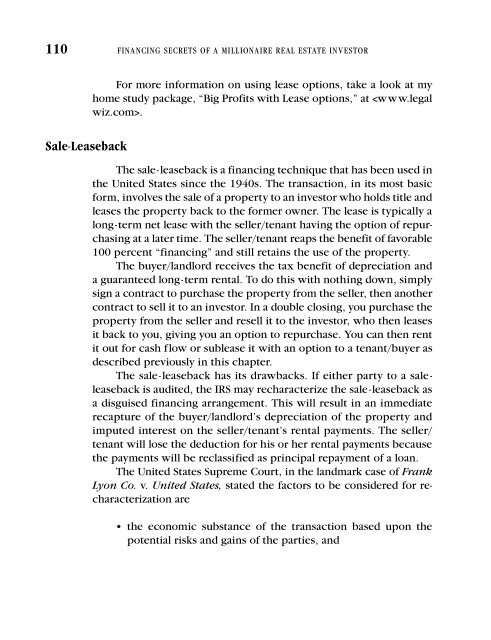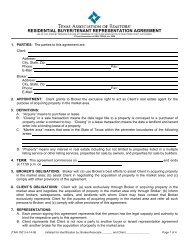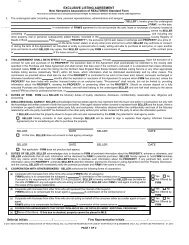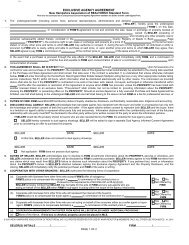financing secrets of a millionaire real estate investor.pdf
financing secrets of a millionaire real estate investor.pdf
financing secrets of a millionaire real estate investor.pdf
You also want an ePaper? Increase the reach of your titles
YUMPU automatically turns print PDFs into web optimized ePapers that Google loves.
110 FINANCING SECRETS OF A MILLIONAIRE REAL ESTATE INVESTOR<br />
For more information on using lease options, take a look at my<br />
home study package, “Big Pr<strong>of</strong>its with Lease options,” at .<br />
Sale-Leaseback<br />
The sale-leaseback is a <strong>financing</strong> technique that has been used in<br />
the United States since the 1940s. The transaction, in its most basic<br />
form, involves the sale <strong>of</strong> a property to an <strong>investor</strong> who holds title and<br />
leases the property back to the former owner. The lease is typically a<br />
long-term net lease with the seller/tenant having the option <strong>of</strong> repurchasing<br />
at a later time. The seller/tenant reaps the benefit <strong>of</strong> favorable<br />
100 percent “<strong>financing</strong>” and still retains the use <strong>of</strong> the property.<br />
The buyer/landlord receives the tax benefit <strong>of</strong> depreciation and<br />
a guaranteed long-term rental. To do this with nothing down, simply<br />
sign a contract to purchase the property from the seller, then another<br />
contract to sell it to an <strong>investor</strong>. In a double closing, you purchase the<br />
property from the seller and resell it to the <strong>investor</strong>, who then leases<br />
it back to you, giving you an option to repurchase. You can then rent<br />
it out for cash flow or sublease it with an option to a tenant/buyer as<br />
described previously in this chapter.<br />
The sale-leaseback has its drawbacks. If either party to a saleleaseback<br />
is audited, the IRS may recharacterize the sale-leaseback as<br />
a disguised <strong>financing</strong> arrangement. This will result in an immediate<br />
recapture <strong>of</strong> the buyer/landlord’s depreciation <strong>of</strong> the property and<br />
imputed interest on the seller/tenant’s rental payments. The seller/<br />
tenant will lose the deduction for his or her rental payments because<br />
the payments will be reclassified as principal repayment <strong>of</strong> a loan.<br />
The United States Supreme Court, in the landmark case <strong>of</strong> Frank<br />
Lyon Co. v. United States, stated the factors to be considered for recharacterization<br />
are<br />
• the economic substance <strong>of</strong> the transaction based upon the<br />
potential risks and gains <strong>of</strong> the parties, and










